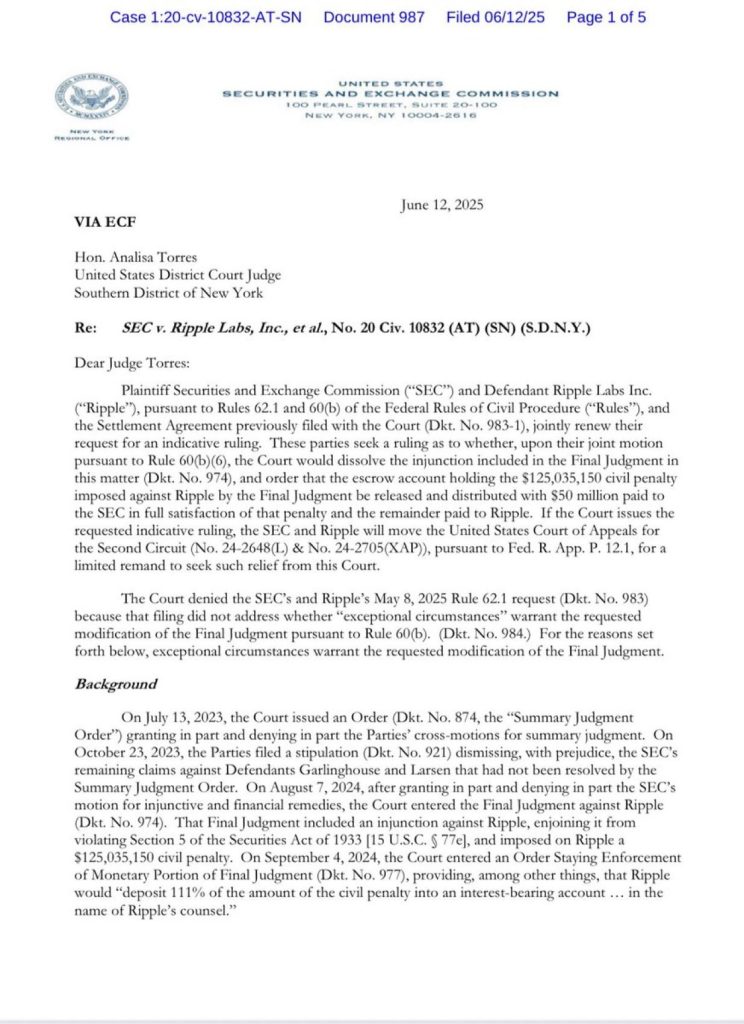
2023-4-20 20:18 |
Currency exchange Ripple has launched a bold challenge to the Securities and Exchange Commission’s interpretation of the Investment Advisers Act. They argue that they had not received fair notice of what activities would be deemed as illegal under SEC guidelines. Could Ripple’s unique legal strategy prove successful in defending against the charges?
Ripple’s legal strategy could prove fatal for the SEC’s long-held ideas about financial transparency rules. If so, crypto lawyers will gain insight into how corporations can dispute regulatory interpretations while ensuring compliance with applicable laws.
The SEC’s Lawsuit Against RippleIn a move that rocked the cryptocurrency world, the SEC filed a lawsuit against Ripple in December 2020. The company is a blockchain-based payments firm that developed the ledger and cryptocurrency XRP. The SEC alleges that Ripple and its executives raised more than $1.3 billion in 2013. Further, they did this through the sale of unregistered digital assets, which the SEC considers securities.
This has caused a major stir in the cryptocurrency community. Many are wondering what the ramifications of the lawsuit will be and how it will affect the future of cryptocurrencies. Some are even speculating that the outcome of the case could lead to a significant shift in how the US government regulates cryptocurrencies.
What the ultimate outcome of the legal battle will be is still up in the air, but one thing is certain. Ripple and the SEC are in for a long and contentious fight.
Did the SEC Fail to Provide Fair Notice?Ripple’s battle with the SEC over whether its digital asset, XRP, is a security or not, has dominated business headlines. Ripple has recently argued that the SEC failed to provide fair notice to the industry about its stance on cryptocurrencies and securities, specifically in regard to XRP.
This argument suggests that Ripple was unfairly blindsided by the SEC’s charges against it. As Ripple fights for what it believes is fair treatment, the SEC digs its heels deeper.
Another element to Ripple’s argument is that it is a decentralized entity. Thus, no one “owns” the network. In this case, XRP would not necessarily pass one of the cornerstones of the Howey Test. That is, depending on the crypto literacy of the person administering the test.
Setting a Precedent for Similar ChargesWhen it comes to financial markets, the SEC is the ultimate watchdog. So what happens in this case, which is expected to end later this year, will have widespread implications.
The case against Ripple has drawn widespread attention and the scrutiny of industry experts. It highlights the legal challenges and complexities that arise when dealing with the emerging technologies that underpin the crypto industry. Plus, the SEC’s failure to guide the industry in the right direction.
Many cases against crypto industry leaders occurred because of regulatory confusion. It is difficult to know you are breaking a rule if the rules are not explicit. Given that crypto has been around since 2009, the SEC should have a more rigorous framework in place by now.
As cryptocurrencies become more mainstream, regulators are grappling with how to properly oversee them while balancing the need to foster innovation. Ultimately, the case could have significant implications for the future of the crypto industry and its regulatory landscape. It could also impact the crypto industry’s trust in the SEC. Depending on whether they feel the SEC is acting in good faith or not could encourage innovation to move elsewhere.
What If Ripple Wins?The outcome of the ongoing Ripple lawsuit has numerous implications for the cryptocurrency industry. If Ripple prevails, it could set a precedent for other cryptocurrencies facing similar legal challenges. Regulators may need to reassess their approach to cryptocurrency regulation as their current framework may not apply to all digital currencies equally.
Additionally, if Ripple is successful, it could signal to investors that cryptocurrencies are becoming less risky and more mainstream.
However, if Ripple loses the case, that could lead to more stringent regulation of cryptocurrencies. Policymakers might aim to prevent other digital currencies from being used in ways that violate securities laws.
Regardless of the outcome, the Ripple lawsuit is likely to impact how regulators and investors navigate the evolving world of cryptocurrencies.
The post Has Ripple Found a Fatal Flaw in the SEC’s Armor? appeared first on BeInCrypto.
origin »Bitcoin price in Telegram @btc_price_every_hour
Ripple (XRP) на Currencies.ru
|
|







